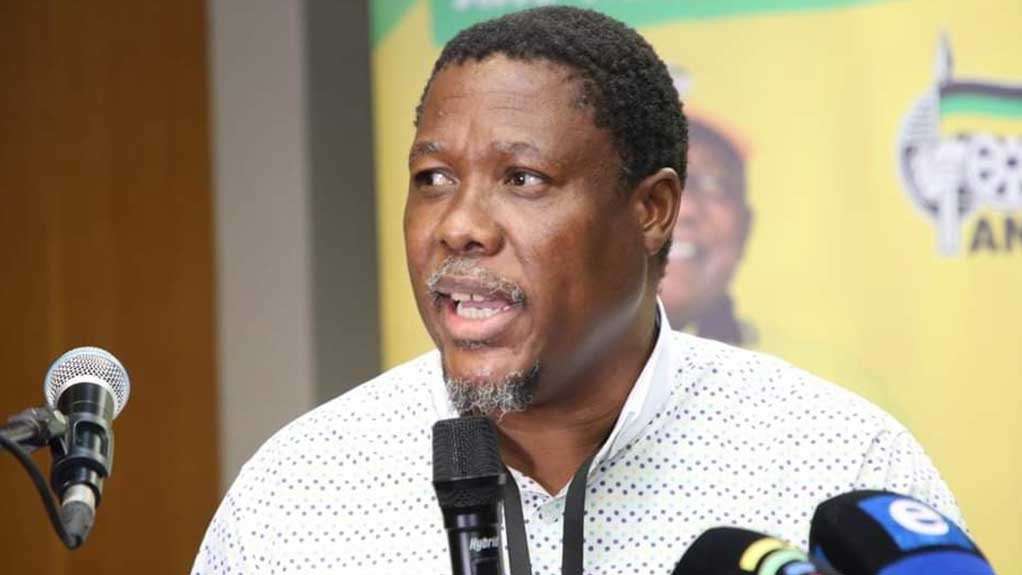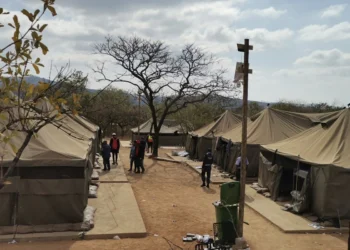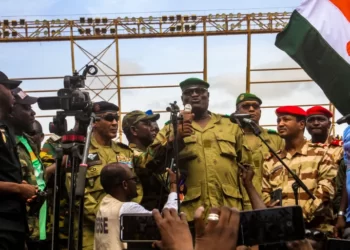A prominent former government minister in South Africa has severed ties with the ruling African National Congress (ANC), launching a scathing critique of the party.
Nathi Nhleko expressed deep dismay at witnessing the transformation of the ANC into a political entity he no longer identifies with. He also accused it of implementing austerity measures and undermining state-owned enterprises.
Nhleko, who had close ties to the embattled former President Jacob Zuma, made his departure amid ongoing controversy within the ANC. Earlier this year, the party suspended Zuma for his support of a rival political faction.
In response to Nhleko’s resignation, an ANC official dismissed his departure with a curt “good riddance.”
Mr. Zuma aligned himself with the newly formed uMkhonto we Sizwe (MK) party on December 26, taking a leading role in rallying support for the party ahead of the upcoming general election on May 29.
While it remains uncertain whether Mr. Nhleko plans to follow suit, there are resemblances in the language of his resignation letter to that employed by Mr. Zuma when he declared his endorsement of MK in December last year.
MK, named after the armed wing established by the ANC during the struggle against white-minority rule in South Africa, continues to draw attention and speculation amid the country’s political landscape.
During his tenure as the police minister in Mr. Zuma’s cabinet, Mr. Nhleko gained notoriety for his defense of the allocation of $23 million (£15 million) in government funds for renovating Zuma’s private residence in the village of Nkandla.
Criticism ensued as Nhleko justified the expenditure by citing it as necessary for security enhancements.
Notably, he faced widespread ridicule for describing the construction of a swimming pool as a “fire pool,” purportedly intended for firefighting purposes in case of emergencies at the residence in Zuma’s hometown of Nkandla in KwaZulu-Natal province.
The renovation project also included the construction of an amphitheater, cattle enclosure, and chicken run, further fueling public scrutiny and debate.
Nhleko’s Resignation Highlights Party Disarray Ahead Of Elections
On the campaign trail in January 2024, ANC Secretary-General Fikile Mbalula said Mr Nhleko was “sweating” at the time as he was forced to defend “lies” in parliament.
Mr Nhleko suggested that these comments resulted in his decision to quit the party.
“In the past few years, I have observed that I no longer recognize this ANC that I joined, the ANC whose only aspiration was to liberate our people,” he said, in the resignation letter.
This included handing control of key sectors of the economy to the “white-dominated private sector”, and reducing “social spending” to the detriment of the financially needy, Mr. Nhleko added.

In his response, ANC KwaZulu-Natal Secretary Bheki Mtolo said that Mr. Nhleko had destroyed his political career when he described the swimming pool as a “fire pool”.
Mr Mtolo said, “It’s good riddance, it’s long overdue.”
Mr Nhleko served as the minister of police from 2014 to 2017. Shortly after, he was appointed as the minister of public works and remained in that position until Mr Zuma’s removal as president by the incumbent, Cyril Ramaphosa.
In December 2023, Mr Zuma said it “would be a betrayal” to campaign for the Ramaphosa-led ANC in the May election.
He accused Mr. Ramaphosa of being a “proxy of white monopoly capital”, a charge the ANC has denied.
A recent opinion poll, published last February 2024, indicated that the MK party commands approximately 10% of the national vote, with even stronger support, capturing a quarter of the vote, in Mr. Zuma’s stronghold of KwaZulu-Natal.
This upcoming election is anticipated to pose significant challenges for the ANC, as multiple opinion polls suggest the party may face the prospect of losing its outright majority for the first time since assuming power in 1994.





















